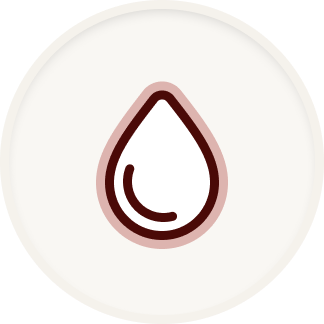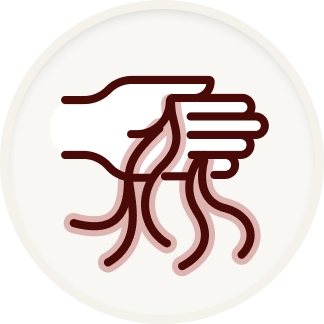
Female hair loss
Hair loss related
to Nutrition
For your hair to grow well, your body needs energy and nutrients.
An unbalanced diet or a weakened intestine can lead to deficiencies, weaken hair follicles and cause hair loss.
[ 1 ]
Understanding the mechanisms
Hair follicles, where hair is born, are very active and require a lot of energy to function. This energy comes from cellular metabolism, which in turn depends on the nutrients you provide to your body.
When the diet is unbalanced, too rich in fast sugars ( high glycemic index ), or poor in vitamins , minerals and proteins , this can slow down growth and cause hair loss. Why? Because these deficiencies force the hair to enter the shedding phase earlier, which is called the telogen phase .
But that's not all: even if you eat well, your gut plays a key role. If it's unhealthy, it can have trouble absorbing the right nutrients. An unbalanced gut microbiota can therefore have a direct impact on the quality of your hair.
[ 2 ]
The numbers
In France, among women of childbearing age
have an iron deficiency
Women are particularly at risk of iron deficiency, particularly due to heavy periods.
suffer from iron deficiency anemia
Sources:
Understanding iron deficiency anemia . (nd). ameli.fr | Assured. https://www.ameli.fr/assure/sante/themes/anemie-par-carence-en-fer/comprendre-anemie-carence-fer#:~:text=Dans%20le%20monde%2C%20plus%20d,%2C%20et%205%20%25%20une%20an%C3%A9mie.
[ 3 ]
Recognize the signs
NUTRITIONAL DEFICIENCIES
Type of hair loss: diffuse and progressive, often accompanied by thinner, brittle or dull hair. Sometimes associated with general fatigue or fragile nails.
Causes: insufficient intake of nutrients through food (iron, zinc, vitamin D, B vitamins, proteins, etc.).
Common triggers: restrictive diets, eating disorders, unbalanced diet.
HIGH GLYCEMIC INDEX DIET
Type of hair loss: diffuse and sometimes accompanied by excess sebum, itching or dandruff. Hair becomes thinner over time.
Causes: hormonal imbalance induced by blood sugar spikes, which can stimulate the production of androgens (hormones that can accentuate the drop).
Common triggers: ultra-processed foods (pastries, sodas, white bread, processed foods, etc.), sugary snacks, meals low in fiber and protein.
UNBALANCED GUT HEALTH
Type of loss: diffuse and persistent, sometimes associated with digestive disorders (bloating, irregular transit, inflammation), chronic fatigue or skin problems.
Causes: poor absorption of vitamins and minerals necessary for hair growth.
Common triggers: taking antibiotics, chronic stress, low-fiber diet, excess processed foods, lack of variety on the plate.
[ 4 ]
TAKE BACK CONTROL
Hair loss related to poor diet, high glycemic index, or intestinal imbalance is often temporary. This is because hair follicles are not destroyed and can produce new hair as soon as your supply of essential nutrients is restored, your gut is functioning better, and you control your intake of fast-acting sugars.
However, if these problems persist, they can weaken scalp health, disrupt hormonal balance, slow regrowth, and promote the development of chronic conditions such as androgenic alopecia.
KEY NUTRIENTS FOR OPTIMAL HAIR GROWTH
- Vitamins (B vitamins and vitamin D)
- Minerals (iron, zinc and selenium)
- Proteins and fatty acids (eggs, meats, fish, legumes)
KEY ELEMENTS FOR OPTIMAL GUT HEALTH
- Probiotics and prebiotics (yogurts, kombucha, kefir, kimchi, miso, fermented vegetables)
- Avoid processed foods
- Favor foods rich in fiber (fruits, vegetables, whole grains, legumes)
- Drink enough water
The sooner you act by rebalancing your diet and taking care of your gut health, the faster and more effective hair regrowth will be. While correcting the internal cause is crucial, it's equally important to stimulate hair growth, particularly by promoting blood circulation to ensure essential nutrients reach the hair follicles. Full recovery can take between 3 and 6 months as the hair cycle regains its balance.
The HACT routine was designed specifically to address this type of problem.
YOUR TAILORED ROUTINE
[ 5 ]
A WORD FROM THE FOUNDERS

Marie
Co-founder of HACT
In summary
Link between diet and hair loss

Unbalanced diet
Diet too rich in fast sugars ( high glycemic index ), or poor in vitamins , minerals and proteins

Lack of essential nutrients
Hair and hair follicles do not receive adequate nutrients (minerals, proteins, vitamins)

Metabolic dysfunction
Decreased follicle cell activity and reduced keratin production

Weakening of the follicle
Hair bulbs enter the resting phase (telogen) prematurely

Hair loss
This resting phase of the follicle causes telogen effluvium (diffuse hair loss visible when washing or styling)
















